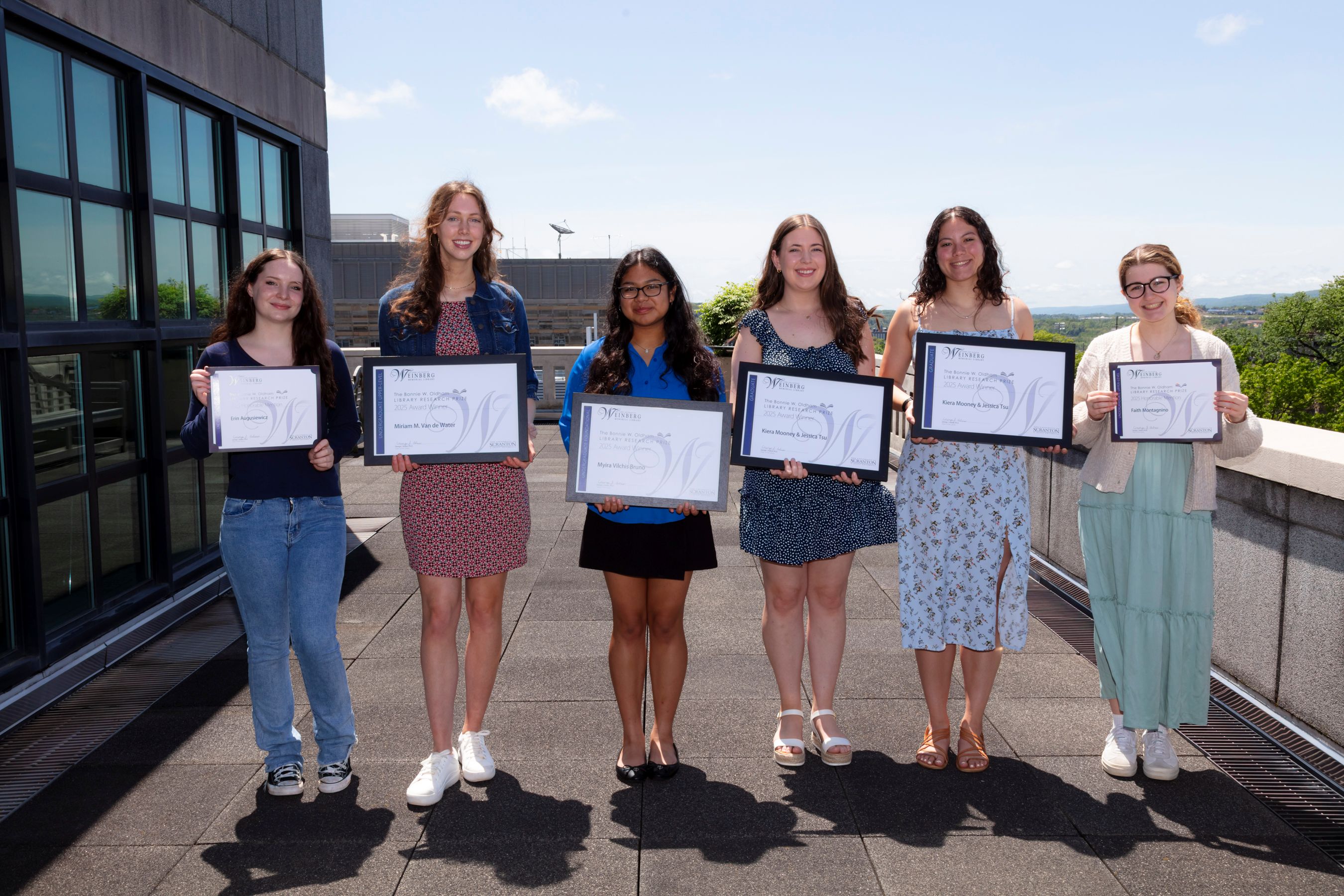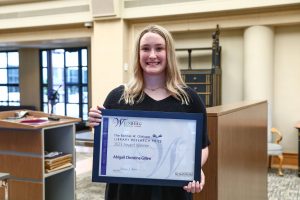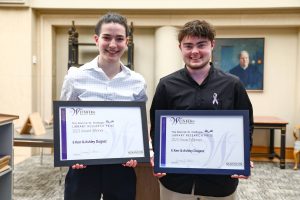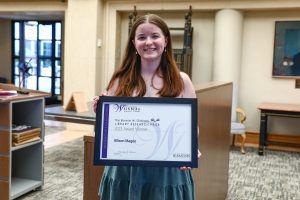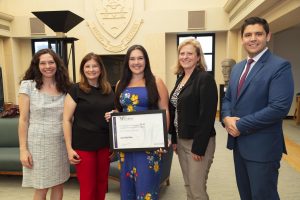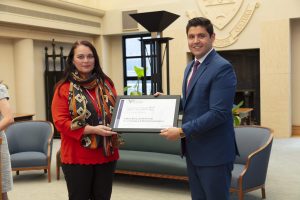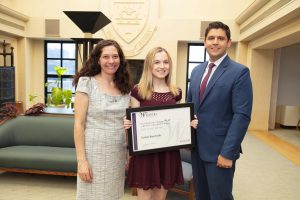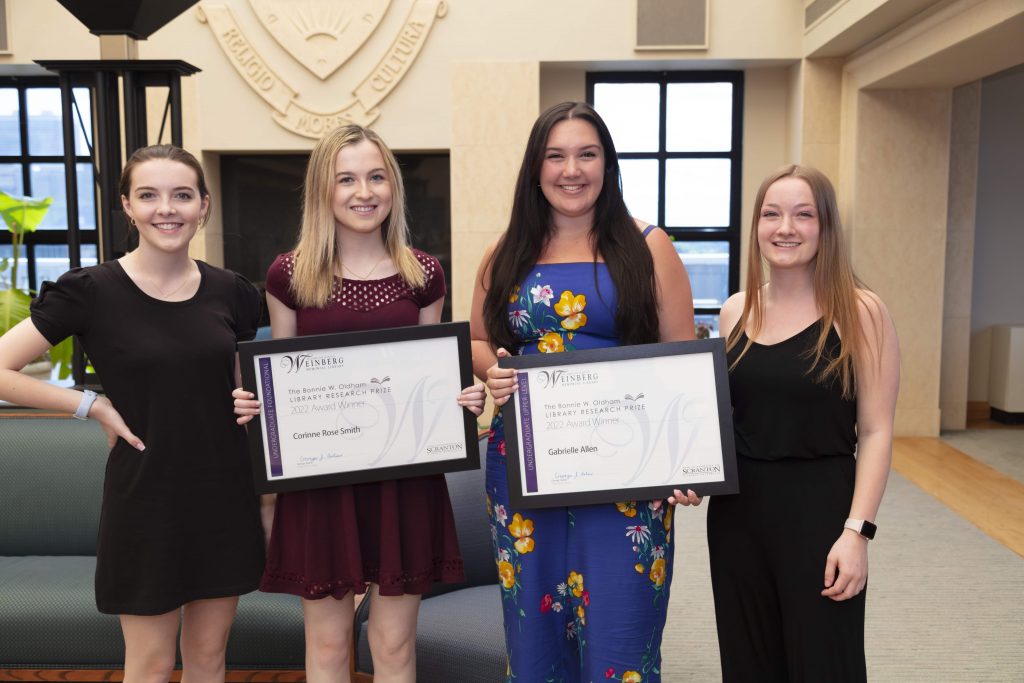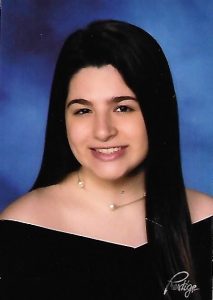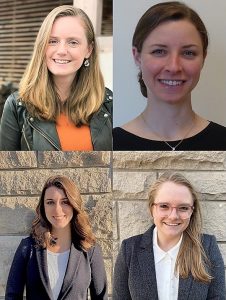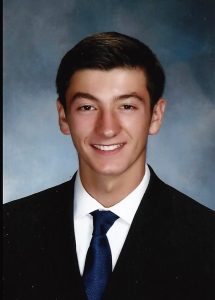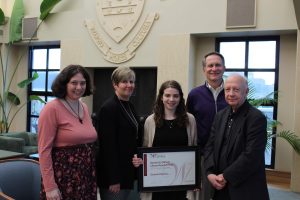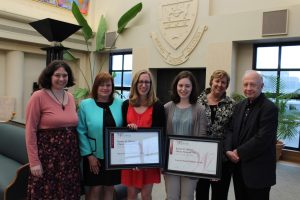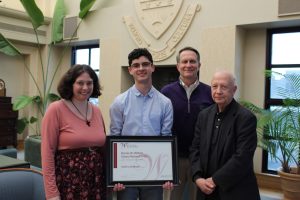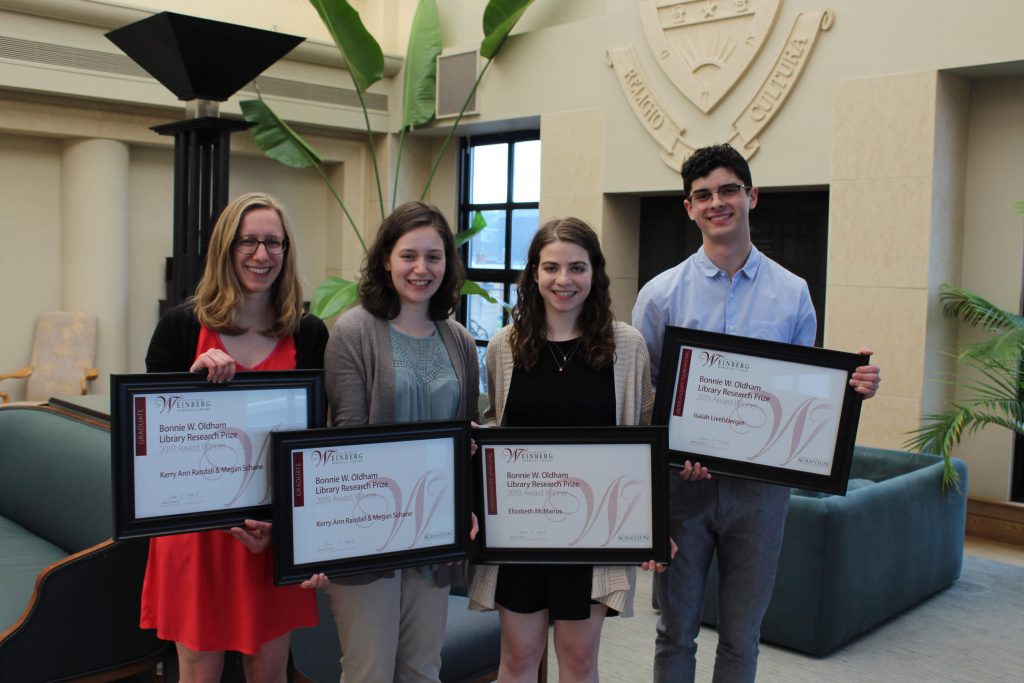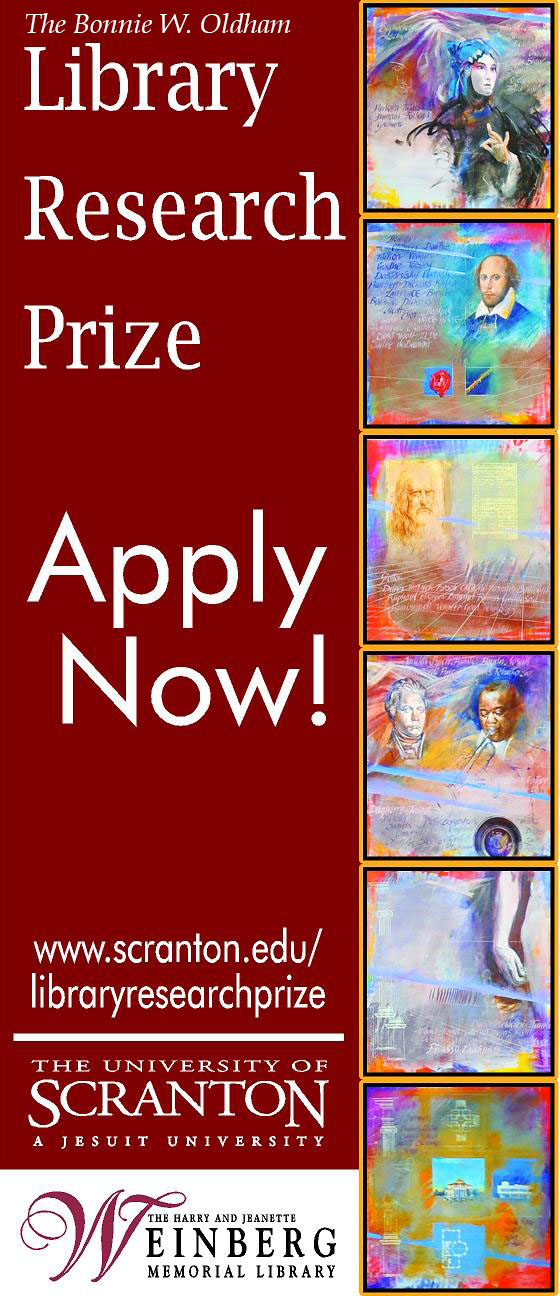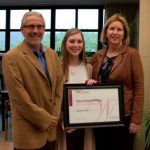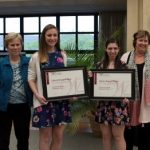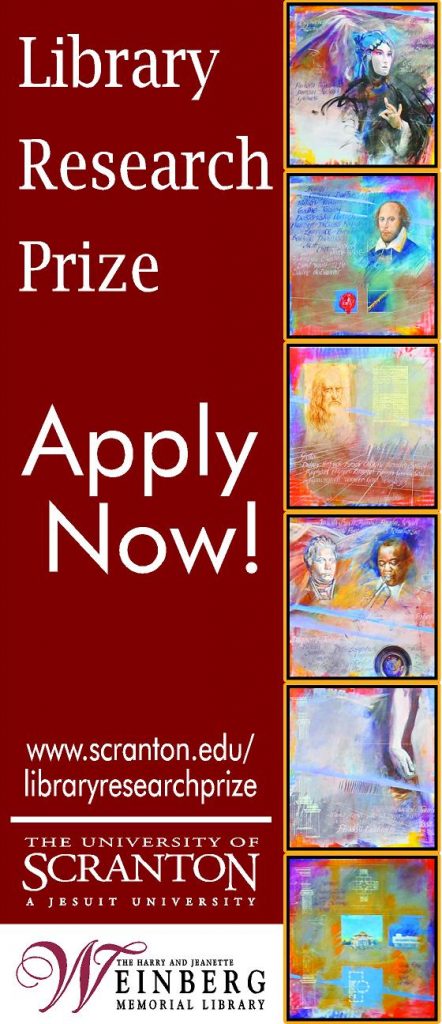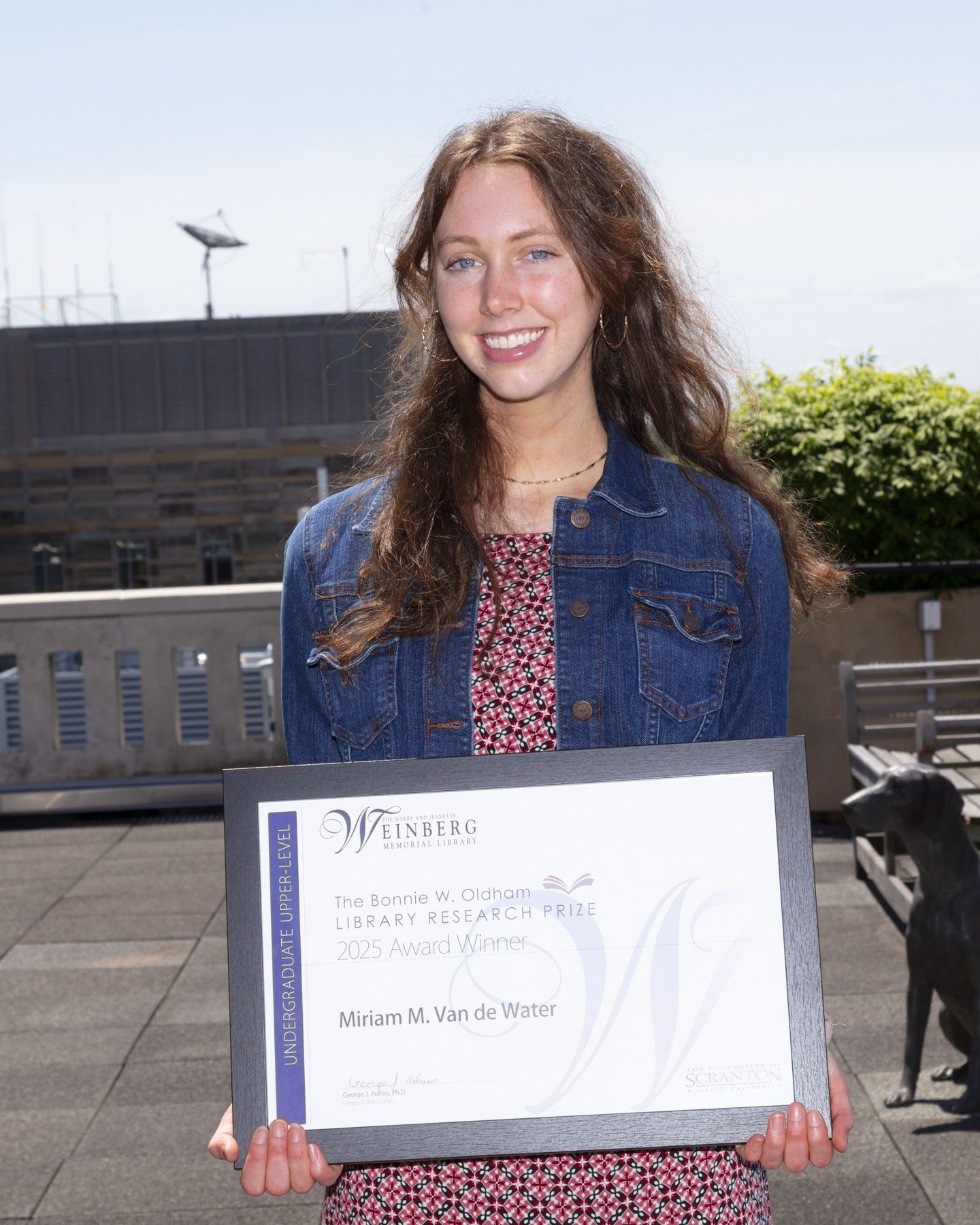
Miriam M. Van de Water is the winner of the 2025 Bonnie W. Oldham Library Research Prize in the Undergraduate Upper-level category, which is awarded to the winning project completed in a 200- to 400-level course.
Miriam is a graduating senior Mathematical Sciences and Neuroscience double major with a minor in Philosophy and a concentration in Biology. She submitted to the competition her Honors thesis titled “Examining the Outcomes of Collective Decision Making Over Time,” completed in the course MATH 489H: Honors Project II, advised by Dr. Jason Graham. Miriam explains in her description of research that her Honors research topic, which was “to explore how collective decision-making and sociality influence population fitness,” led her to “discover the importance of breaking large research questions into manageable pieces—whether determining which parameter to test, learning to build simulations, or choosing the best way to visualize complex results.”
Miriam describes the Library as playing a central role in her research journey. She discusses using the Library’s resources, spaces, and services to structure and support her work; she says, “Being immersed in that space helped structure my thinking and reinforce the seriousness and excitement of the work I was doing.” She describes working on the Library’s second floor while preparing a literature review and using the Library’s computer labs to build simulations and write early drafts of her research paper. She also recounts a research consultation with a faculty librarian that revealed overlooked areas in her honors project, stating: “her input reminded me that research is ultimately about communication, and that excellence isn’t just technical—it’s also about clarity, accessibility, and collaboration.”
Miriam’s research journey is also characterized by reflection and personal transformation. She discusses living out the Ignatian principle of Contemplation in Action which helped nurture her character and clarify her professional goals. Miriam explains: “My work was rooted in long, quiet hours of focused thought, literature review, and coding—but it was always oriented toward application. I wasn’t just thinking for the sake of thinking; I was using those insights to build something, to contribute to a broader scientific conversation.”
She concludes her description of research by sharing the following reflection about her work on this project: “This project did more than fulfill a graduation requirement. It taught me how to break down big questions into manageable pieces, how to reach out for help, and how to sit with uncertainty until clarity emerged. It showed me that research is not only about discovery but also about formation—about becoming a person capable of asking better questions, communicating ideas thoughtfully, and navigating complexity with humility and care.” She further reports that her work on this project has helped develop her confidence as a researcher as she prepares to begin her PhD in Biomathematics at North Carolina State University in the Fall.
The Honorable Mention award in the Undergraduate Upper-level category was presented to Faith Montagnino, a third-year English major with Writing and Philosophy minors in the SJLA and University Honors programs, for her project titled “Reading and Writing to Heal: Poetry Therapy as a Tool for Person-Centered Group Therapy,” completed in the course HONR 385H: Poetry as Therapy for Dr. Paul Datti.
Kiera Mooney and Jessica Tsu are the winners of the 2025 Bonnie W. Oldham Library Research Prize in the Graduate category.
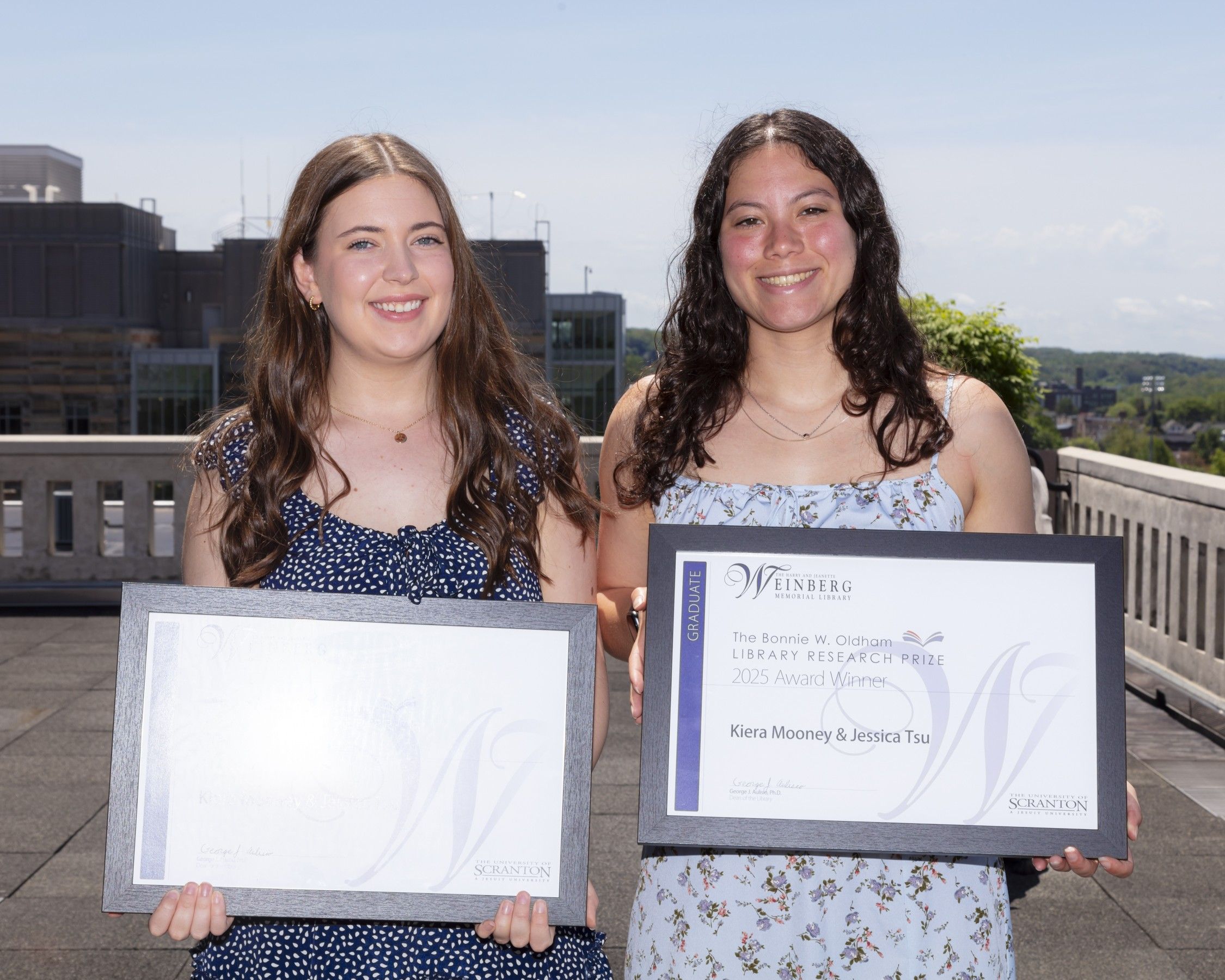
Kiera and Jessica, graduate students in the Master of Science in Occupational Therapy program, submitted to the competition their project titled “The Role of Gender Throughout the History of Occupational Therapy,” completed in the course OT 544: Leadership Principles, Ethics, and Pragmatics, taught by Dr. Marlene Morgan. This historiographical research project explores the role of gender makeup on the occupational therapy workforce over the past century and incorporates evidence from primary sources from the 1910s to present day.
Kiera and Jessica found this evidence by searching a multitude of Library databases including SAGE Journals, PubMed, MEDLINE, EBSCO, JSTOR, and JAMA Network, as well as the Internet Archive and the Library’s microfilm collection. On the latter, they noted in their description of research, “Looking at the microfilm took an unexpected amount of patience, but it became an immersive experience for us to participate in that further expanded our education.” They also utilized the advanced research technique of citation chasing, which taught them that research “will not always be as simple as typing in one keyword and finding the perfect article.”
Initially looking for why there were more women than men in the field, the research process evolved for Kiera and Jessica as they found other gender inequities towards women, such as wage gaps, discrimination, and gender stereotypes. They discovered these other dimensions of their topic through the research process, which required that they reassess and change their approach to searching, which “steered [them] in an unexpected direction.” They found this process and discovery enlightening as they confronted the struggles of working women throughout time.
Kiera and Jessica were pushed by this project to become better researchers and embodied the Jesuit principle of magis, or the “restless desire for excellence.” Realizing they were the first students to choose this topic for their research in this course, they knew they had their work cut out for them. They share, “The hours that we spent scouring databases, citation chasing, using microfilm, and digging through archives exhibit our determination and perseverance in creating a detailed paper that accurately showed the whole story of this topic throughout history.”
The Honorable Mention award in the Graduate category was presented to Doctor of Physical Therapy students Nicolette George, Mary Kallberg, Julia LeMay, and Stephanie Patullo, for the project, “Physical Therapy versus Complementary and Alternative Medicine Effects on Post-Episiotomy Pain: A Systematic Review,” completed in PT 773: Scientific Inquiry III for PT for Dr. Lori Walton.
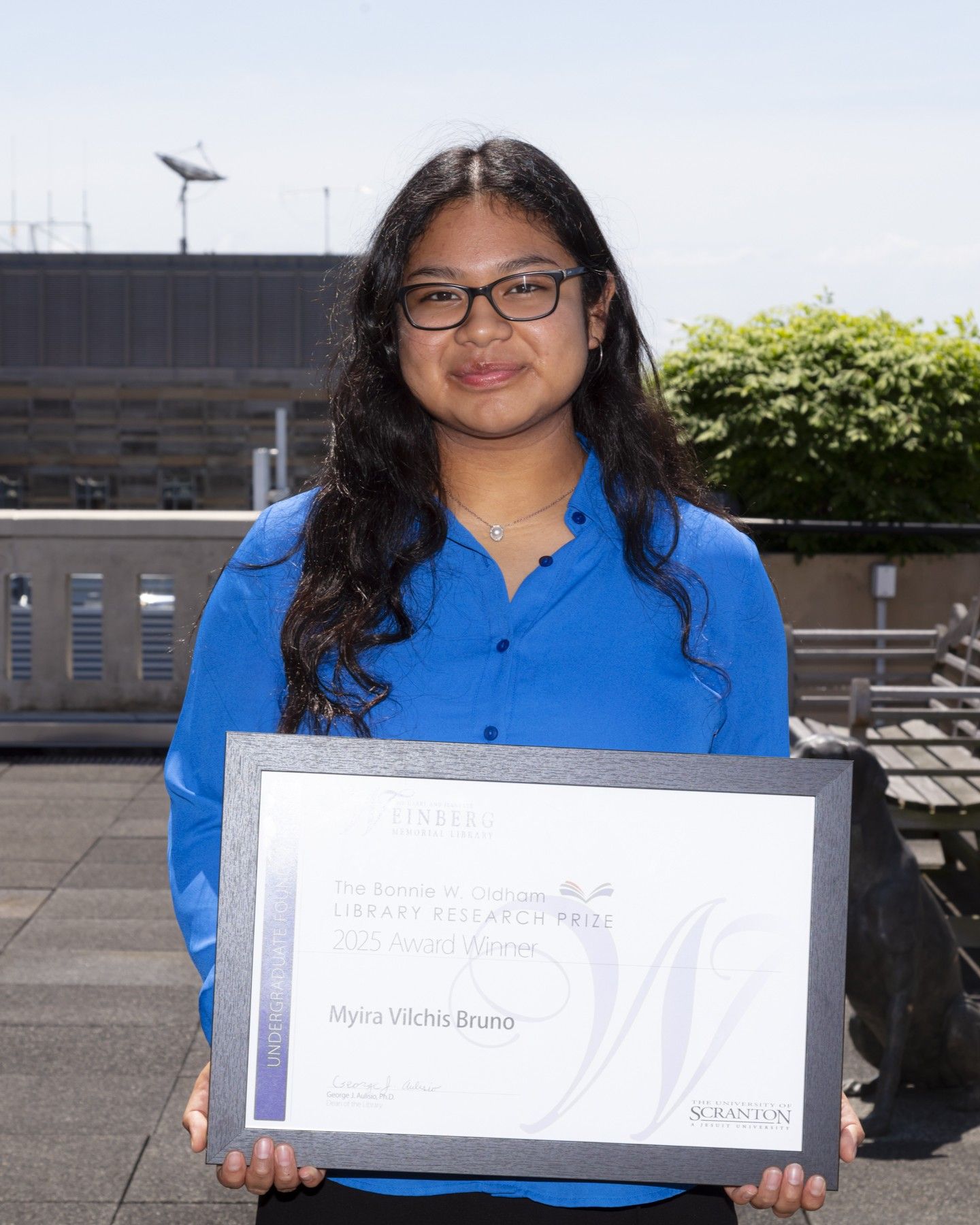
Myira Vilchis Bruno is the winner of the 2025 Bonnie W. Oldham Library Research Prize in the Undergraduate Foundational category, which is awarded to the winning project completed in a 100-level course.
Myira is a first-year Political Science major with a Legal Studies concentration who submitted her paper titled “Directly American,” completed in Prof. Dawn D’Aries Zera’s Writing 107: Composition course. Tasked with researching an argumentative contemporary issue related to her major, Myira chose to research and write on how direct democracies are more beneficial than representative democracies. On her motivation for researching this topic, Myira notes in her description of research, “I am always finding new ways to expand my knowledge of our current democracy and how it alters the law.”
Myira began her research in an information literacy class taught by a faculty librarian where she learned how to search for materials in a variety of formats that contained evidence she could use to support her argument. In the A-Z list of databases, Myira found the EBSCO database Academic Search Premier, which became one of her most utilized databases for finding useful and relevant sources. She describes using the search filters to narrow her results to peer-reviewed academic journal articles published between 2018 and 2025. Myira also notes the usefulness of the article saving feature in the EBSCO platform, which allowed her to save articles to refer to later while continuing on with her research process. She describes how using different keywords related to her topic enabled her to extend her research beyond analyses of the United States to such countries as Germany, Britain, and Botswana.
Myira also shares that learning about the Library’s Publication Finder tool in her information literacy instruction session prompted her to use it to locate specific journals related to the field of Political Science, such as the Journal of Regional Science and the American Political Science Review, which helped her focus her research more directly on scholarly work related to her essay topic. This tool also enabled her to easily explore streaming media related to her topic that was accessible through the Library, which was a format requirement for one of her sources for this paper.
In reference to her research project, Myira states: “Before sufficiently navigating the library databases, I would spend more time finding sources than writing. This caused me to doubt my writing because I thought it was inaccurate. I grew unmotivated to write, and I no longer enjoyed it like I did before. However, I kept in mind the Ignatian value of Cura Personalis or ‘Care for the Person.’ I was still passionate about making sure I had full support on my side of the argument.” She further notes, “Research on democracies across the globe was a special interest of mine because I hope to practice international law in the future. To advance my future, I had to focus on the present.”
The Honorable Mention award in the Undergraduate Foundational category was presented to first-year Psychology major Erin Augusiewicz, for the project, “Psychedelic Treatment?” completed in WRTG 106: College Writing II for Prof. Dawn D’Aries Zera.
Currently celebrating its 15th year, the Weinberg Memorial Library inaugurated the Library Research Prize in 2011 to recognize excellence in research projects that show evidence of significant knowledge of the methods of research and the information gathering process, and use of library resources, tools, and services. In 2017, the prize was named for Professor Emerita Bonnie W. Oldham, who founded the prize at the University in 2011. The Bonnie W. Oldham Library Research Prize was fully endowed in 2019 and consists of a prize of $500 awarded to winning projects in each of the three categories: Undergraduate Foundational (100-level projects), Undergraduate Upper-level (200- to 400-level projects), and Graduate.
Prize winners were honored at an Awards Ceremony & Reception on Friday, May 16, 2025 in the Charles Kratz Scranton Heritage Room of the Weinberg Memorial Library.
Information about the Bonnie W. Oldham Library Research Prize can be found on the website: http://www.scranton.edu/libraryresearchprize
Congratulations to all of our honorees!
